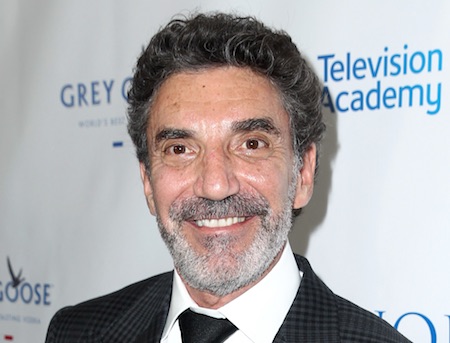Lorre-Netflix Fit Seems, Well, Disjointed

The smarter way to stay on top of broadcasting and cable industry. Sign up below
You are now subscribed
Your newsletter sign-up was successful
Chuck Lorre…pot comedy…Kathy Bates…Netflix.
The equation is perplexing on many levels, but when peeking inside the head of Lorre, the greatest sitcom spawner of his generation, it gets a little less hazy.
Netflix announced earlier in the week that it has ordered Disjointed, a multicamera workplace comedy from Lorre, starring Bates as the owner of a marijuana dispensary. The initial order is for 20 episodes, double the norm for a typical Netflix comedy, such as Master of None and The Ranch.
Lorre has emerged as one of the very few individuals who’ve solved the cryptic art of the broadcast comedy, with Two and a Half Men, The Big Bang Theory, Mom and Mike & Molly, all part of the CBS family, among his creations. (Going back a bit, his series include Cybill, Grace Under Fire and Dharma & Greg.)
Broadcast has zero shows up for a best drama Emmy in September, while ABC has two comedies nominated, in black-ish and Modern Family. Netflix’s Master of None and Unbreakable Kimmy Schmidt, HBO’s Silicon Valley and Veep, and Amazon’s Transparent round out the Emmys comedy field.
Speaking at an HRTS luncheon late last year, alongside crime drama maven Dick Wolf, Lorre was defiant about broadcast’s lack of respect among tastemakers and awards givers. He referred to traditional comedies as “the red-headed stepchild” and said of shooting in front of a live audience: “Put your comedy in front of 200 people and see if they laugh. It’s really hard. It’s really, really hard. If the material isn’t right, you can hear the 134 Freeway going by.”
We spoke with Lorre in the spring, before he was to be inducted into the NAB Hall of Fame. He said broadcast and streaming are “very different” things and was intrigued by what he could do with more running time, far fewer network standards, no commercial breaks and air schedules not interrupted by repeats or sports. “Mom is 22 minutes, with severe language restrictions. It’s just the way it is,” he said. “If it’s 29 or 32 minutes, it’s a very different piece of material—that’s an enormous amount of time, and it changes the way you tell stories.”
The smarter way to stay on top of broadcasting and cable industry. Sign up below
Lorre added, “You don’t edit for time. You do the show in the best way you can imagine it can be done, and that’s it—you’re done.”
The idea of creating a series for a bingeable platform is enticing, Lorre said, noting how his measure of a show’s success is how badly the viewer is itching to watch the next episode. “The relationship with your audience in network television is much more difficult,” he said, “due to the time factor in between episodes.”
Lorre is writing Disjointed alongside David Javerbaum, whose credits are as varied as The Daily Show, satirical newspaper The Onion, Broadway show An Act of God and a handful of books.
Warner Bros. Television is producing Disjointed alongside Chuck Lorre Productions. One wonders how much of an effort the broadcast nets made to snag Disjointed; the pot dispensary setting surely gave them a reason to pass. Vulture notes that the pilot script did not blow some Hollywood types away.
Kathy Bates may seem like an odd choice for the lead. She’s better known for her dramatic work than her comedy stuff and for theatrical films more than television. She won a lead actress Oscar for Misery and was twice nominated for supporting actress, for her turns in Primary Colors and About Schmidt. Bates’ TV work includes American Horror Story: Coven and Harry’s Law, and she did a guest stint on Two and a Half Men.
Lorre stressed that broadcast has treated him well, and he has nothing to complain about. But he added about SVOD, “That they’re different playing fields should be acknowledged once in a while.”
Michael Malone is content director at B+C and Multichannel News. He joined B+C in 2005 and has covered network programming, including entertainment, news and sports on broadcast, cable and streaming; and local broadcast television, including writing the "Local News Close-Up" market profiles. He also hosted the podcasts "Busted Pilot" and "Series Business." His journalism has also appeared in The New York Times, The L.A. Times, The Boston Globe and New York magazine.

